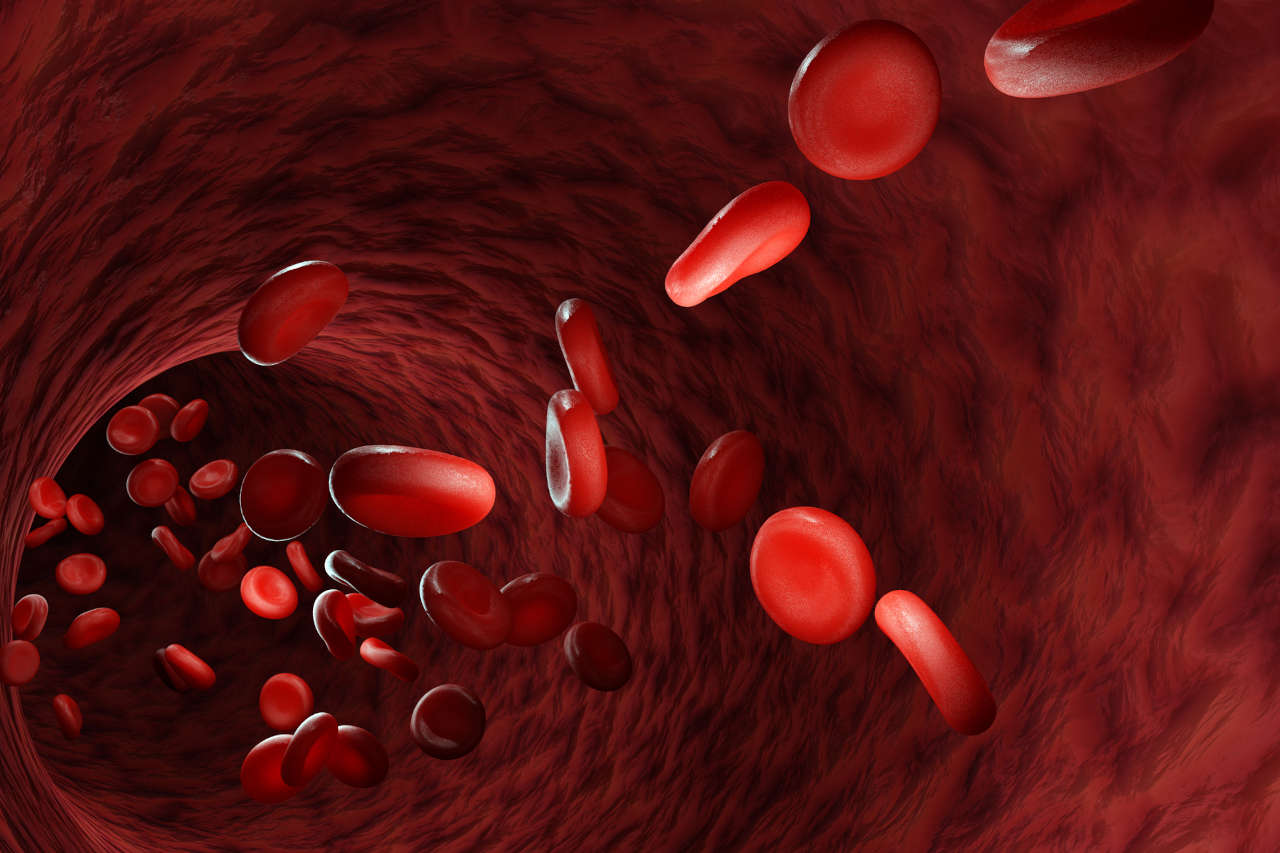
Reblozyl, also known by its generic name “luspatercept,” is a prescription drug used to treat symptoms of anemia (low red blood cell counts) in adult patients suffering from blood disorders such as myelodysplastic syndrome (MDS) and beta thalassemia.
Speak to a Specialist
About Copay AssistanceReblozyl belongs to the drug class of “erythroid maturation agents” (EMA) that works to improve the erythropoiesis process (a process involved in the production of mature red blood cells). In other words, it works by creating more mature, working red blood cells (RBCs) and allows immature cells to mature and work the correct way. This improves the quality of RBCs and increases the amount of hemoglobin (Hgb) in the body, resulting in the improvement of anemia because there are more mature RBCs in the bloodstream. Reblozyl is the only drug of this class that is FDA-approved for treating anemia in adult patients who require regular red blood cell (RBC) transfusions or whose anemia does not respond well to other erythroid maturation agents.
Reblozyl can only be obtained through a doctor’s prescription and is available in single-dose vials for injection purposes in two different strengths: 25 mg and 75 mg.
What Is Reblozyl Used To Treat?
Reblozyl has been approved as a first-class therapy to treat anemia associated with the following blood disorders in adults:
- Beta thalassemia – a rare type of inherited blood disorder in which patients either have missing or defective genes that make beta globin protein. This protein is a component of hemoglobin protein present in RBCs which carries oxygen around the body. When you have thalassemia, your body is making less hemoglobin than normal, and it can result in mild or severe anemia. When hemoglobin levels are low, it can cause muscle weakness, fatigue, and many more serious complications. Reblozyl is indicated in adult patients with beta thalassemia who require regular RBC transfusions.
- Myelodysplastic syndrome (MDS) – a group of cancers in which immature blood-forming cells in the bone marrow do not develop (mature) or become healthy functional cells. The most common cells affected by MDS are red blood cells. When immature cells do not work the way that they should, this leaves less room for healthy white blood cells (WBCs), RBCs, and platelets to form in the bone marrow. Anemia, infection, or easy bleeding can occur as a result of fewer healthy blood cells.
Patients diagnosed with MDS or its subtypes called myelodysplastic/myeloproliferative neoplasm with ring sideroblasts (MDS-RS) or with thrombocytosis-associated anemia who have failed an erythropoiesis-stimulating agent (EPO) and required two or more RBC units (for transfusion) over 8 weeks may be eligible to receive Rebloyzl treatment.
The purpose of using Reblozyl in patients with the above-mentioned disorders is to reduce the number of blood transfusions and transfusion associated-complications. However, it is important to note that Reblozyl is not to be used as a substitute for RBC transfusions in patients who need immediate correction of anemia. It is also not known if Reblozyl is effective or safe in children below 18 years of age.
How Does Reblozyl Work?
Under normal circumstances, immature red blood cells mature and develop into functional, healthy cells within the bone marrow via the erythropoiesis process. Erythropoiesis is a dynamic process that starts with the proliferation of erythroid precursors and ends with the maturation of healthy RBCs within the bone marrow. The mature RBCs then move into the blood circulation and perform their function of oxygen transport around the body.
Ineffective erythropoiesis results in a lower RBC count and a higher risk of anemia. Ineffective erythropoiesis occurs due to the overactivity of the Smad2/3 signaling pathway that slows down or stops the normal RBC maturation in B-thalassemia and MDS patients.
Reblozyl, also known by its generic name: “luspatercept,” is a recombinant fusion protein that binds selected transforming growth factor-β (TGF-β) superfamily ligands. When it binds to specific endogenous ligands, it blocks Smad2/3 signaling, resulting in erythroid maturation in the bone marrow and leads to the normal development of RBCs.
Dosage Form and Strength
Reblozyl comes in sterile, white to off-white lyophilized powder form in 25 mg and 75 mg strengths.
Reconstitution of Reblozyl Powder in Sterile Water
- A 25 mg/single-dose vial is reconstituted with 0.68 ml sterile water. Each 25 mg single-dose vial will deliver at least 0.5 ml of 50 mg/ml of luspatercept.
- A 75 mg/single-dose vial is reconstituted with 1.6 ml sterile water. Each 75 mg single-dose vial will deliver at least 1.5 ml of 50 mg/ml of luspatercept.
A syringe with graduation marks should be used to administer accurate dosages.
Get Financial Assistance for Reblozyl
Reblozyl Dosing Information
The dose of Reblozyl is adjusted according to the patient’s body weight, hemoglobin, and transfusion records. The recommended initial dose of Reblozyl is 1 mg/kg once every 3 weeks.
Dose Modification for B-thalassemia Patients
The future doses are modified under the following conditions:
- If the patient shows insufficient response to the initial dose (1 mg/kg once every 3 weeks) and does not achieve a reduction in RBC transfusions after two treatments ( at least 2 consecutive doses/6 weeks), the dose can be increased to 1.25 mg/kg once every 3 weeks (maximum dose).
- Discontinue the treatment if patients show insufficient response to the modified dose (1.25 mg/kg) and do not achieve a reduction in RBC transfusions after three treatments (3 doses/9 weeks).
Dose Modification for MDS Patients
The future doses are modified under the following conditions:
- If the patient shows insufficient response to the initial dose (1 mg/kg) and does not achieve a reduction in RBC transfusions after two treatments (2 doses/6 weeks), then increase the dose to 1.33 mg/kg once every 3 weeks.
- If patients show an insufficient response to the modified dose (1.33 mg/kg) and do not achieve a reduction in RBC transfusions after two treatments (2 doses/6 weeks), then increase the dose to 1.75 mg/kg once every 3 weeks.
- Discontinue the treatment if patients show an insufficient response to the modified dose (1.75 mg/kg) and do not achieve a reduction in RBC transfusions after three treatments (3 doses/9 weeks).
How Is Reblozyl Given?
Reblozyl medication is only given subcutaneously (under the skin) once every three weeks.
You will receive a Reblozyl injection under the skin of the abdomen (belly), upper arms, or thighs. This medication will be injected under a healthcare provider or an experienced nurse’s supervision to avoid later complications.
Is Reblozyl a Form of Chemotherapy?
Reblozyl is not a form of chemotherapy but a prescription drug used to treat anemia associated with MDS and beta thalassemia in adults.
Possible Side Effects of Reblozyl

The most common side effects of Reblozyl include:
- Feeling tired
- Muscle or bone pain
- Dizziness
- Diarrhea
- Stomach (abdominal) pain
- Allergic reactions
- Headache
- Joint pain (arthralgia)
- Nausea
- Cough
- Signs of a common cold
- Flu-like signs
Some serious side effects that may occur include:
- Blood clots (thrombosis/thromboembolism)
- The risk may be greater in people who have had their spleen removed or who take birth control pills or hormone replacement therapy.
- It is important to call your healthcare provider or get medical help immediately if you experience any of these symptoms:
- Chest pain
- Difficulty breathing or shortness of breath
- Pain in your leg, with or without swelling
- A pale or cold arm or leg
- Sudden numbness or weakness that is short-term or continues to occur over an extended period of time, especially if it’s on one side of the body
- Severe headache or confusion
- Sudden dizziness or trouble with seeing, walking, speaking, or balancing
- High blood pressure (hypertension)
- Your provider will check your blood pressure before you receive your Reblozyl dose
- Extramedullary hematopoietic (EMH) masses
- It is important to call your healthcare provider or get medical help immediately if you experience any of these symptoms:
- Severe back pain
- Numbness, weakness, or loss of voluntary movement in the legs, arms, hands, or feet
- Loss of bowel and bladder control
- It is important to call your healthcare provider or get medical help immediately if you experience any of these symptoms:
Get Copay Assistance for Reblozyl
Precaution
Reblozyl therapy is not for everyone. You should consult your healthcare provider before taking Reblozyl therapy if you:
- Are pregnant. Reblozyl may cause fetal harm. Therefore, it is recommended to avoid Reblozyl treatment during pregnancy.
- Are planning to become pregnant. Use birth control or effective contraception during treatment and for at least 3 months after the final dose.
- Are breastfeeding or planning to breastfeed. Since the data on Reblozyl presence in human breast milk is limited, breastfeeding is not recommended while receiving Reblozyl injections and for at least 3 months after the final dose.
- Are allergic to any component of Reblozyl.
- Have or had a history of hypertension and extramedullary hematopoietic (EMH) masses.
- Had a splenectomy (spleen removal).
- Have or had an enlarged spleen or liver.
- Take multivitamins, herbal supplements, or over-the-counter medicines.
Cost
The cost of this medication can vary and depends on the pharmacy you visit. Please contact us if you are interested in copay assistance for Reblozyl.
REFERENCES:
-
- US Food and Administration (FDA). Reblozyl prescribing information. https://www.accessdata.fda.gov/drugsatfda_docs/label/2020/761136orig2lbl.pdf
-
- European Medicines Agency (EMA). Reblozyl prescribing information. https://www.ema.europa.eu/en/documents/product-information/reblozyl-epar-product-information_en.pdf
-
- REBLOZYL®. (n.d.). REBLOZYL® (Luspatercept-aamt) Patient Site. https://www.reblozyl.com/
-
- Myelodysplastic Syndromes Treatment (PDQ®)–Patient Version. (2022, March 4). National Cancer Institute. https://www.cancer.gov/types/myeloproliferative/patient/myelodysplastic-treatment-pdq
-
- NHS website. (2021, November 18). Myelodysplastic syndrome (myelodysplasia). nhs.uk. https://www.nhs.uk/conditions/myelodysplasia/
-
- Beta thalassemia: MedlinePlus Genetics. (n.d.). https://medlineplus.gov/genetics/condition/beta-thalassemia/
-
- https://www.hopkinsmedicine.org/health/conditions-and-diseases/beta-thalassemia













